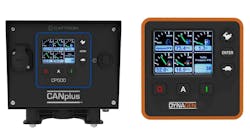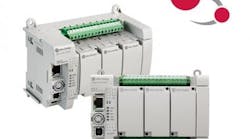A multi axis motor control EPOS2 36/2 motherboard
Intelligent control applications often call for multi-axis solutions to meet demanding performance requirements. Configuring a control solution in a mother board / daughter board array is a convenient and proven method of addressing these types of applications. OEM style daughter boards, like Maxon’s EPOS2 36/2 drive/controller, offer excellent flexibility in design but require custom wiring solutions. This process is often too expensive and time consuming for designers who may not have the resources to undertake a complete development, especially with increasingly short proof-of-concept times. The new EPOS2 36/2 motherboards make product development faster and easier, giving the designer either a standalone multi-axis motor controller or one that can be integrated into the final product as a sub board.
Starting with 11 nodes connected together via CAN-Open, the unique snap apart construction allows for quick multi-axis customization on a “single” board. Each node mates with an individual EPOS2 36/2 drive/controller and provides connection points. Standard cables are available in stock. Two digital inputs and one digital output are mapped on the board with an additional I/O expansion module as an option. USB and RS232 communication modules are available for users that don’t want to use CAN.
Functionalities of the EPOS 2 motor speed, torque and position controller with multi axis motherboard include:
- Speed and Position feed forward control. EPOS supported motion controlled acceleration and speed.
- PVT - Interpolated Position Mode. The controller is capable of synchronously running a coordinated multi-axis path dictated by interpolating points.
- Step and Direction. Implemented for replacing stepper motors with highly dynamic brushless DC motors.
- Point to Point motor position control. The CANopen Profile Position Mode moves the position of the motor from point A to point B. The motor position is relative to the absolute home position or the axis relative position.
- Torque Control. Sinusoidal motor control resulting in a minimum torque ripple.
- Electronic Gearing. Using an external encoder as a master, multiple motors can be synchronized with a user input software gearing factor.
- Motor Holding Brake Control.
- Position Compare and Position Mark. Save and sending of digital signal (Trigger and Capture)
- Dual Loop Speed and Position Control. Precision motor control with load mounted high resolution SSI absolute and incremental encoders.





